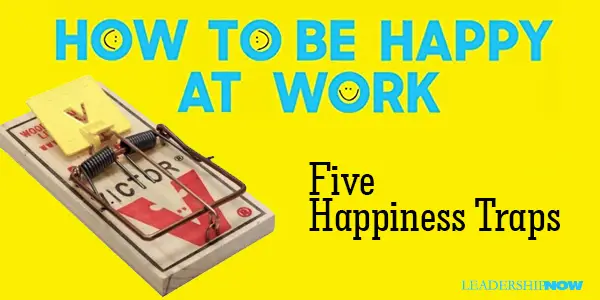 |
 |
12.18.17

Five Happiness Traps
T However, considering the time we spend at work, it should not be a mindless task. Work can be hard, but we should find it invigorating as we rise to meet the challenges and grow our capabilities. Annie McKee shares in How to Be Happy at Work, five happiness traps. They are five traps we fall into that keep us from finding true happiness at work. The Overwork Trap Overwork is very common as we try to keep up with changes, do more with less, work across time zones, escape stress at home, and the sense of importance it gives us. “I’m busy,” is a badge we often wear. McKee quotes Sarah Green Carmichael on this: “We log too many hours because of a mix of inner drivers, like ambition, machismo, greed, anxiety, guilt, enjoyment, pride, the pull of short-term rewards, a desire to prove we’re important, or an overdeveloped sense of duty.” McKee says this overwork is not good for us as it negatively impacts our health and relationships. It keeps us “stuck and striving” and it “shuts down our ability to decipher what we should be doing.” In this state, it’s hard to be happy. First, we must discover why we are working so much. Do we really have to or is it a habit? The Money Trap “Money is great,” says McKee, “until our desire for it overshadows reason.” It’s not always about greed. It’s often deeper than that. “The decision to choose money over happiness is fueled by insecurity, social comparison, and the need to display one’s power for all to see.” We need to tune in to what really brings us happiness in life. “Wouldn’t it be better if money was an outcome that followed our good work rather than a goal in itself?” The Ambition Trap Ambition is not a bad thing until it drives us to be ultra-competitive and focused on winning. When we will do anything, compromise anything to come out on top without regard for the collateral damage, we are in trouble. “First, success isn’t really success when we define it as a win-lose, zero-sum game. Second, hypercompetitiveness in the workplace leaves us empty and unfulfilled, hurts our ability to lead effectively, and makes us no fun to be around. Finally, when ambition and the desire to win at all costs takes over, there’s usually something deeper going on—something we need to examine.” The “Should” Trap We all at one time or another do things because we feel we should even though we don’t want to. Of course, there are things that we should do even when we don’t want to because they are right. But there are “shoulds” that are really not more than expectations placed on us by others or society at large that no longer make any sense. There are “shoulds” that “we are forced to adhere to—whether they are society’s or our organizations’—are truly at odds with who we are and what we believe. That is soul destroying.” Social rules and “shoulds” are a fact of life. It’s not about getting rid of them; it’s about sorting through them and making conscious choices about which to follow—those that enable you to live your values, reach your potential, and be happy. The Helplessness Trap It may sound fatalistic, but as the world continues to change at an ever-increasing pace, there is a sense that we can’t keep up and therefore can’t control what happens to us. When we feel this way, helplessness sets in. “It kills hope, shatters dreams, and leaves us at the mercy of others and the vagaries of our organizations.” It’s easy to feel defeated by life and circumstances. Fear of the unknown makes us feel helpless, but with a bit of courage we can exercise more control over our lives and find happiness at work. Breaking Free from the Happiness Traps Dealing with these happiness traps begins with a little introspection and learning to manage our emotions/feelings. With reflection we can begin to understand why we do and think the things we do, then we can “actively choose to see things differently—to adapt and shift our mindset from negative to a more positive way of viewing ourselves and our situation.” Think about which happiness trap affects you the most. Mckee suggests asking yourself the following questions:

Posted by Michael McKinney at 09:03 AM
|
BUILD YOUR KNOWLEDGE
 

How to Do Your Start-Up Right STRAIGHT TALK FOR START-UPS 
Grow Your Leadership Skills NEW AND UPCOMING LEADERSHIP BOOKS 
Leadership Minute BITE-SIZE CONCEPTS YOU CAN CHEW ON 
Classic Leadership Books BOOKS TO READ BEFORE YOU LEAD |